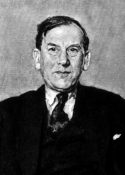
Alfred R. Orage
1873–1934
Equipped with the barest formal education, a formidable natural
intelligence and an unquenchable yearning to understand, ALFRED RICHARD ORAGE emerged from British 19th Century working class poverty to
survey the significant literary, psychological, political, and spiritual trends of the early 20th century. His literary skills and wide range of interests led him to edit the enormously influential journal The New Age from 1907 until 1922 when he moved from London to Fontainebleau to join Gurdjieff. In January 1924, Orage went to New York to help Gurdjieff with his first visit to America and later introduced and supervised the Work there. In May 1930, he returned to England and became deeply involved with political issues and was instrumental in rekindling interest in the socialist movement called ‘Social Credit’ which became a fringe force in politics for many decades. He founded a new journal The New English Weekly in April 1932. He was planning to introduce Gurdjieff’s ideas in that paper and elsewhere when he died on the night of November 5, 1934.
Louise Welch, author of Orage with Gurdjieff in America (1982) was in Orage’s New York Gurdjieff group and was uniquely qualified to write about him. This thoughtful introduction was written for the compilation, On Love and three essays from the Notebook of A. R. Orage, which she edited. It was privately published in a limited edition of 200 copies in 1969 by the Society for Traditional Studies (Toronto) and is reproduced with the kind permission of the publisher.
An introduction to Orage by Walter Driscoll; concludes with a brief bibliography.
An essay by Gorham Munson, a friend and literary colleague of Orage and member of his group in New York for several years. This article was first published in Tomorrow (New York) Vol 9, Issue 6, Feb. 1950, pp. 20–25. Written three months after Gurdjieff’s death, a year after the publication of Ouspensky’s In Search of the Miraculous and months before the publication of Gurdjieff’s Beelzebub’s Tales, Munson’s informed summaries and penetrating observations contain little that is dated.
Drawn from a variety of published and unpublished sources, these extraordinary fragments provide a brief introduction to Orage’s vision of the human potential for a conscious development of being.
Orage was editor of the enormously influential journal the New Age from 1907 until 1922. Under the title of "Readers and Writers", Orage contributed many essays of which these are a partial reprint. For more information on the New Age, see the site initiated by Dr. Robert Scholes of Brown University, an Experimental Guide to the New Age.
An essay by A. R. Orage first published in a series of articles titled "Fifteen Exercises in Practical Psychology" in Psychology Magazine (New York) between April 1925 and January 1926. Orage examines sleep and waking as a psycho-spiritual metaphor. He concludes,
"To be aware that we are asleep is to be on the point of waking; and to be aware that we are only partially awake is the first condition of becoming and making ourselves more fully awake."
Orage adopts Gurdjieff’s metaphor of the human psyche as a thee-storied factory and proposes the idea of a three-storied stage set that would thus depict the basic facts of human psychology. First published in The Little Review, New York, Vol. X (2), Winter 1926.
Michael Benham reviews Paul Beekman Taylor’s Brother in Elysium: Orage in Gurdjieff’s Service forthcoming Samuel Weiser, Winter 2000/2001. Drawing on a wealth of unpublished Orage family archives, Taylor assembles the most comprehensive Orage biography to date. He vividly reconstructs the 1922–1933 period to demonstrate that A. R. Orage’s involvement with Gurdjieff was the natural evolution of his own search and not an aberration as presumed by Orage’s literary biographers.
This material is edited from the notes and letters of Frederick Schneider (1883–1933), who was a student of A. R. Orage in New York in the late 1920s, and spent time at the Prieuré. While the material overlaps some published sources, it offers a fresh contemporaneous report of Gurdjieff’s teaching as transmitted by Orage.
“We do not turn on the lights over the whole house when we are only using one floor. That would be a waste of light. Similarly we ought not to be using energy on all three stories of our organism when we are only actually using one of them.”
“Each time we make an effort to bring our attention back to ourselves,
to what we are doing, to remember ourselves, the centres become connected.”
This webpage © 2000-2015 Gurdjieff Electronic Publishing
Revision: October 26, 2015
|
